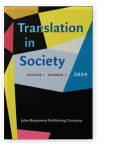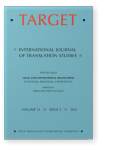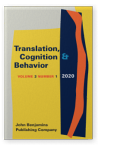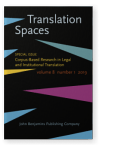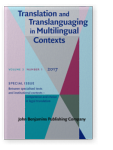Cornelia Griebel
List of John Benjamins publications for which Cornelia Griebel plays a role.
2024 Role making in translational contexts: A qualitative study on the different roles of intercept interpreters/translators in covert communication surveillance Translation in Society 3:2, pp. 177–201 | Article
This study examines the roles of intercept interpreters/translators (IITs) in covert communication surveillance. Despite their increasing importance in global criminal investigations, their roles remain underexplored in academic research. Utilizing sociological theories of role taking and role… read more
2021 Legal meta-comments in the think-aloud protocols of legal translators and lawyers: A qualitative analysis Legal and institutional translation: Functions, processes, competences, Prieto Ramos, Fernando (ed.), pp. 183–206 | Article
In order to ensure successful subprocesses within the overall legal translation process, a correct and comprehensive understanding of the source text is crucial. Legal translators must be able to grasp all the legal, linguistic, communicative, and situational dimensions of the text. The focus of… read more
2020 “Article 1103: oh pff… yes—then concerns… the… um… unilateral contract…”: What do hesitation and repair markers tell us about text reception patterns of translators and lawyers? Translation, Cognition & Behavior 3:1, pp. 51–75 | Article
Hesitation and lexical repair markers are part of almost every audibly pronounced sentence. Empirical linguistics generally bases its examinations on spontaneous speech production. This paper uses the discourse analytical approach of empirical linguistics to analyse think-aloud protocols produced… read more
2019 The challenge of multilingual ‘plain language’ in translation-mediated Swiss administrative communication: A preliminary comparative analysis of insurance leaflets Corpus-Based Research in Legal and Institutional Translation, Prieto Ramos, Fernando (ed.), pp. 167–191 | Article
Barrier-free communication should be an institutional priority when drafting administrative texts. These not only deal with legal content, but they often address the lay citizen and may provide general information on services and reforms or simply instruct on a specific procedure to be followed.… read more
2017 Fuzzy concepts in translators’ minds: A cognitive-translational approach to tackling the difficulties of legal translation Between specialised texts and institutional contexts – competence and choice in legal translation, Dullion, Valérie (ed.), pp. 97–113 | Article
Legal texts place particular demands on the reader owing to the institutionalized communication situation, their abstract content and language, and the indirect connection of the utterances with the extralinguistic and extralegal world. Most legal translators are not legal experts. Therefore,… read more
